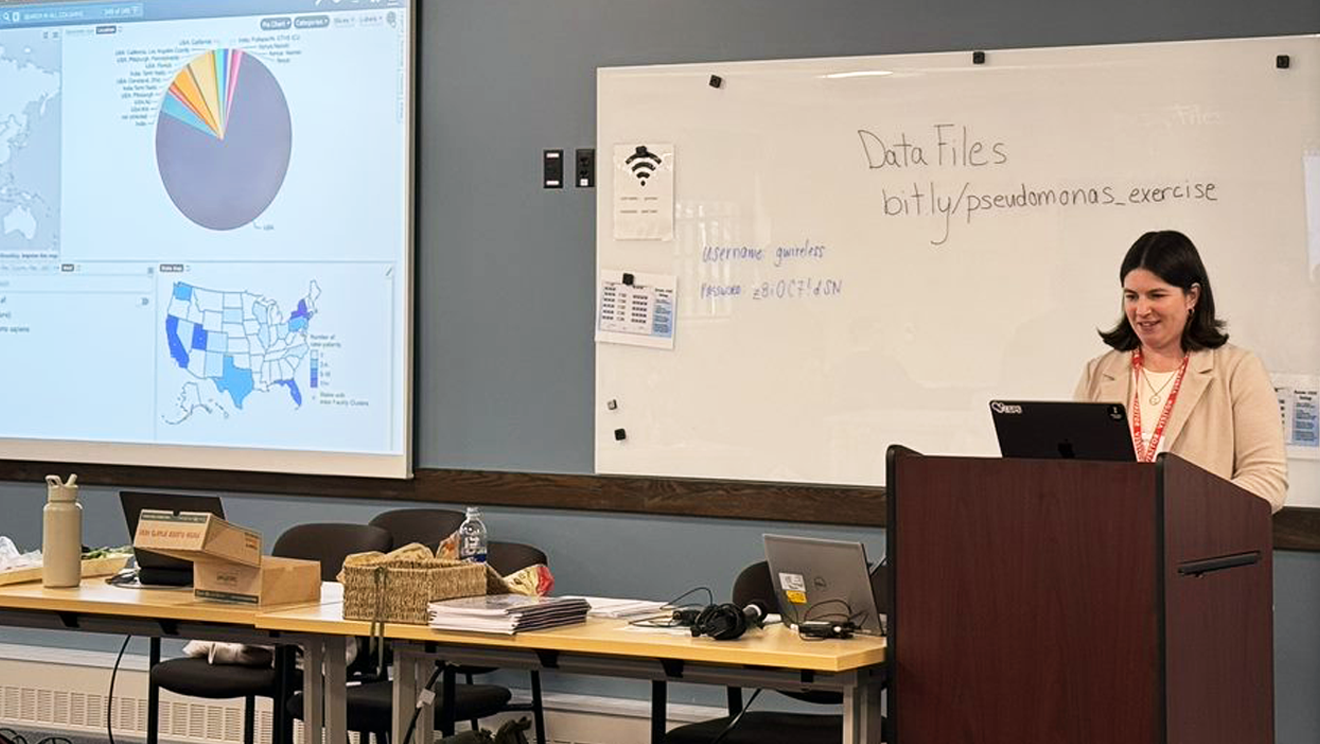At a glance
Genomic epidemiology is critical to the future of public health—it helps detect, track, and respond to outbreaks using pathogen genetic data. Krisandra Allen shares insights on what interested her about genomic epidemiology, why it will be a component of the future of public health, and how those new to the field can be successful.

About Krisandra Allen
Krisandra Allen's interest in bioinformatics was sparked by a CDC Advanced Molecular Detection (AMD) training in 2018, which catalyzed her transition to genomic epidemiology. She focuses on integrating genomic surveillance into public health, and has held positions at public health agencies, and the non-profit and private sectors. Recently, Allen spoke with the AMD Program and offered her perspective on the growth, needs, and critical skills in the field.
Career milestones
What key milestones in your career do you feel have had the most significant impact on your work in genomic epidemiology?
"One day in 2018, the AMD training lead said there was a spot open in a bioinformatics training course and offered it to me." The Office of AMD provides a network of customized support through regional training leads who develop skills and provide training assistance to public health laboratories.
"It was eye-opening to build an analysis pipeline and view the outputs at each step. The class gave me an appreciation of the complexity of bioinformatics. The class also catalyzed my interest in learning more about bioinformatics and also how to incorporate sequencing data into my work."
"The second milestone was in August 2020 when I was officially given the position of molecular epidemiologist at the Washington State Department of Health. I had been advocating for using SARS-CoV-2 sequencing data but was swamped with other pandemic-related duties. Getting the full support of the agency to focus solely on molecular/genomic epi was a game-changer. I had the time to work on things like matching sequences back to [identifiers] in our epidemiologic surveillance system. That time was the key to being able to do things like look at hospitalization rates by variant. This experience convinced me that having at least one epidemiologist with a sole focus of genomic epidemiology is critical to fully integrating genomic data into all aspects of public health work."

Challenges and opportunities
What do you foresee as new challenges or opportunities for genomic epidemiology ?
"Though bioinformatics is relatively new in public health, it's been an established scientific discipline, with academic programs to match. Pathogen genomic epidemiology does not have that same clear definition yet. There are not many graduate programs turning out genomic epidemiologists who can apply pathogen genomics to the prevention and control of infectious diseases."
"We need to identify and build out the competencies and roles. That work should be done in the context of existing systems. It would ensure genomic epidemiology roles are designed to be complementary to the existing bioinformatics programs."
"Organizations like CDC and the Council of State and Territorial Epidemiologists can help through things like creating model position descriptions (such as the Association of Public Health Laboratories's recruitment guide for a laboratory-based genomic epidemiologist position) as well as by seeking out and highlighting stories of successful program models. For example, in some agencies it makes sense to house the genomic epidemiologists within the laboratory, some within epidemiology, and in some agencies they sit on both sides. Highlighting a variety of successful approaches to job duties and program structure can help staff more easily imagine the model that would best fit their own agency."

Using AI/ML to improve genomic epidemiology
How can the integration of artificial intelligence and machine learning enhance the capabilities of genomic epidemiology?
"Epidemiologists do a lot of pattern detection. We're looking across the patients and searching for similarities. For example, imagine that you are conducting interviews and notice each person is a baker. That fact does not mean baking caused the outbreak. It does give us a clue to narrow in on things like flour, eggs, etc. After doing foodborne outbreaks for many years, I got much better at my initial hypothesis generation. Based on my experiences, I have memories of where I have seen certain serotypes. Some memories are the age distributions often associated with specific types of products. Some have to do with the seasonality of outbreaks of different sources, etc."
"AI/ML approaches can help solidify some of those 'gut feelings' and make them more data driven. The possibility of building out systems that can take in genomic data is exciting. For example, this could include the specimen source of other similar isolates in public databases. It could include previous outbreaks associated with closely related specimens. It could include antibiotic resistance genes. It's exciting -- to take that genomic data and combine it with clinical and epidemiologic data, often in free text notes, to generate hypotheses about the outbreak source."
Key skills for success
What skills or areas of expertise do you think are most critical for the next generation of genomic epidemiologists?
"An equal blend of technical and communication skills is critical for success. You need a strong enough understanding of the science to comfortably explain it to an infection preventionist, restaurant owner, or other stakeholder. You also need the communication skills to present it in such a way that it's meaningful and understandable to less technical audiences."
"Seek out every opportunity you can to learn from the bioinformaticians. The opportunities include informal internal meetings, scientific conferences, and formal training events. I find myself learning in every conversation I join, conference I attend, and webinar I watch. Constant curiosity to seek out and grow your knowledge is a key element of becoming a successful genomic epidemiologist."
Resources to stay up to date
In her free time, Allen maintains www.genomicepi.com and posted a resource list of recommended media sources she uses to keep up to date on the field.